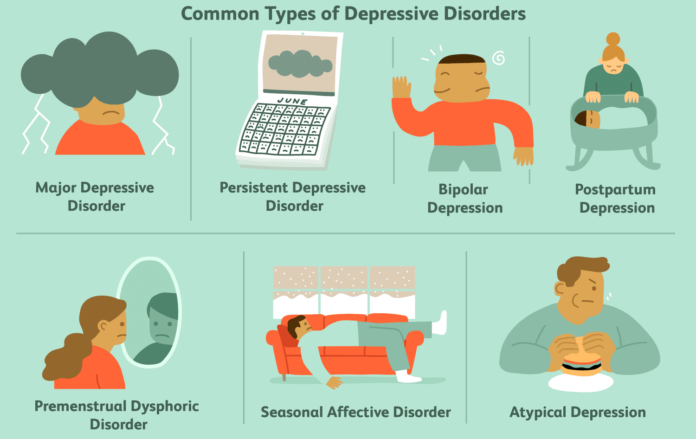Depressive disorders, commonly referred to as depression, are a group of conditions characterized by persistent feelings of sadness and a lack of interest or pleasure in previously rewarding or enjoyable activities. They affect how a person feels, thinks, and handles daily activities, such as sleeping, eating, or working.
Symptoms
Depressive disorders can present a wide variety of symptoms, which can vary in intensity and duration. Common symptoms include:
- Persistent sad, anxious, or “empty” mood
- Loss of interest or pleasure in hobbies and activities
- Changes in appetite or weight
- Insomnia or oversleeping
- Low energy or fatigue
- Feelings of hopelessness or pessimism
- Feelings of guilt, worthlessness, or helplessness
- Difficulty concentrating, remembering, or making decisions
- Irritability or restlessness
- Physical symptoms such as aches or pains, headaches, cramps, or digestive problems without a clear physical cause
- Thoughts of death or suicide, or suicide attempts
Causes
The exact cause of depressive disorders is not fully understood, but they are likely to be a combination of genetic, biological, environmental, and psychological factors. Common causes include:
- Genetics: Depression can run in families, indicating a genetic predisposition.
- Biological differences: People with depression appear to have physical changes in their brains.
- Brain chemistry: Neurotransmitters and their interaction with neurocircuits play a role in mood regulation.
- Hormones: Changes in the body’s balance of hormones may be involved in triggering or causing depression.
- Life events: Traumatic or stressful events, such as the loss of a loved one, financial problems, or a high-stress job, can trigger depression.
- Medical conditions: Chronic illnesses, such as diabetes or heart disease, and certain medications can contribute to depressive disorders.
Treatment
Depressive disorders are treatable, and a variety of effective treatments are available. Treatments include:
- Medications: Antidepressants can help modify brain chemistry. Common types include selective serotonin reuptake inhibitors (SSRIs), serotonin-norepinephrine reuptake inhibitors (SNRIs), and others.
- Psychotherapy: Cognitive-behavioral therapy (CBT), interpersonal therapy (IPT), and other types of talk therapy can be effective.
- Lifestyle changes: Regular physical activity, healthy eating, and sleep hygiene can have a positive impact.
- Electroconvulsive therapy (ECT): For severe cases that do not respond to other treatments, ECT can be effective.
- Other treatments: Newer treatments like transcranial magnetic stimulation (TMS) and ketamine infusions are also being explored.
Prevention
While it may not be possible to completely prevent depression, certain strategies can help reduce the risk or severity of depressive episodes:
- Build strong relationships: Social support can be protective against depression.
- Manage stress: Techniques such as mindfulness, meditation, and stress management skills can be helpful.
- Healthy lifestyle: Regular exercise, a balanced diet, and adequate sleep contribute to overall mental health.
- Early intervention: Addressing early symptoms of depression can prevent them from worsening.
- Avoid substance abuse: Alcohol and drugs can exacerbate depressive symptoms and should be avoided.
Early recognition and intervention are key to managing depressive disorders effectively. If you or someone you know is experiencing symptoms of depression, seeking help from a healthcare professional is crucial.

































